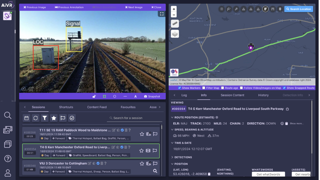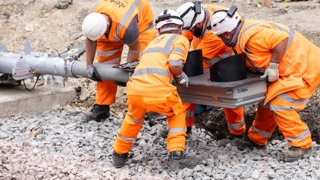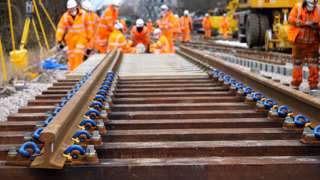Mark Chorley was inspecting a bridge at Paignton station when he heard the news on February 4 that a storm at Dawlish was causing problems.
He was surprised, because he was working in short sleeves at the time. Paignton is only 11 miles from Dawlish as the crow flies, yet back at Dawlish the storm was raging, and staff at the Devon station were battling the elements. But then they often do.
Amid safety concerns, Network Rail made the decision to suspend trains, because of the weather. A First Great Western empty coaching stock move was the last to pass through that day. Unbeknown to everyone, it would be the last FGW train for two months.
Dawlish station is perched above the south Devon beach in a picture postcard setting, but it is totally exposed to the elements. The staff who work there have to contend with this, but are used to it.
That day, however, was described as “like being bombarded from a ship attack”, such was the ferocity of the weather. The Down platform was largely destroyed by waves, with most of it ending up on the track.
Members of staff were not able to retrieve the debris, because they were forbidden from going onto the tracks. Not because of trains, or the lack of personal track safety (PTS) certificates, but because of the sheer force of the waves crashing over the fencing onto the platforms (or at least, what was left of the fencing and platforms).
Different people reacted in different ways.
Phil Muldoon, team technican at Laira, says: “I thought it was serious. I thought we may lose jobs.
Laira Team Leader Steve Manley says he was told it could be shut for six hours.
Al Trevorrow, team leader at Laira, recalls: “We were on nights. We were going to run the trains. Got told there’s a bit of a storm. When we woke up and saw the news, we thought ‘uh-oh’.”
His wife Jane is a customer service host at Plymouth: “Oh God. I was gobsmacked… shocked. When you don’t work on the railway, you don’t realise how important it is.”
Matt Trotter, FGW gateline assistant at Plymouth, says: “I honestly did not know what would happen.”
Brett Nurse, who works in the stakeholder correspondence at Plymouth, says: “I laughed, what else could you do? I wasn’t trivialising it at all, because I wondered how it was going to be fixed.”
FGW Driver Manager Guy Santos says: “I saw the news coverage. What you tend to appreciate is there is little operational flexibility. There is no diversion. It really was cut off.”
FGW South Devon Stations Manager Ian Mundy says: “My reaction was that I am now managing a railway that is not there. I looked at the news and thought ‘what will we do’?”
What happened has been well documented. When Mother Nature is in her most destructive mood, nothing can stand in her way. Not even Brunel’s usually indestructible engineering.
On February 4, a ferocious storm hit the South West, severely damaging the railway. An 80-metre hole was punched in the sea wall at Dawlish, just north of the station. This cut off the railway west of Exeter, leaving 109 miles of railway no longer connected to the rest of the UK network.
Ten days later, on February 14, another storm blasted the region, destroying a further 20 metres of the wall. It was unknown how long the line would be closed, and there is no diversionary route.
Says Manley: “We were in St Philips Marsh (Bristol), and they told us we had better book more hotels. We hadn’t seen the news.”
First Great Western runs the majority of the trains in the South West, and manages the stations. It immediately implemented a wide-ranging bus network, in place of the trains that could not run. These carried passengers between Tiverton Parkway, Exeter St Davids, Newton Abbot and Plymouth, connecting with various FGW trains. Buses also served the stations where there were no trains at all - at Teignmouth, Dawlish, Dawlish Warren and Starcross.
FGW staff were always on hand to offer travel advice and free refreshments. Local trains continued running west from Newton Abbot, with CrossCountry also running a truncated service to Exeter, and then between Plymouth and Penzance.
Meanwhile, out on the wall, Network Rail’s ‘Orange Army’ was busy. A five-mile stretch of railway had been damaged either by the sea or by landslips. No dates had been set for the line to re-open, but NR’s staff were out undertaking repairs at every possible moment, fighting a continuous battle against the elements, as the tide prohibited work at certain times.
Workers had to replace the damaged hole, rebuild the railway and parts of Dawlish station, and ensure that the line from Starcross to Teignmouth was safe. Some shifts lasted up to 20 hours.
Horizontal rain and high tides hampered the repairs. One engineer described the site as looking like a scene from a disaster movie. When they first arrived, track was hanging between two remaining parts of the wall, swinging in the air like an abandoned hammock.
Work included drafting in 18 welded shipping containers to act as a temporary sea wall, to prevent further damage. Engineers rebuilt and fortified the breach using more than 6,000 tonnes of concrete and 150 tonnes of steel, and they removed 25,000 tonnes of collapsed cliff at Woodlands Avenue, Teignmouth, following a landslip on March 4.
By late March engineer’s trains were able to start traversing the line, and on April 4, Prime Minister David Cameron and new NR Chief Executive Mark Carne officially re-opened the railway at Dawlish, thanking the large numbers of ‘Orange Army’ staff whose hard work had made it possible.
To put into perspective the problems caused, Plymouth Council leader Tudor Evans worked out that it would cost the region £20 million for every day the line was closed (RAIL 743). It was shut for 59 days, equating to £1,180 billion lost.
There are 134 weekday passenger trains through Dawlish. Over 50 closed weekdays, that equates to 6,700 cancelled trains. On average, 12,500 passengers pass through Dawlish per day, meaning 625,000 lost weekday journeys during the two-month closure.
NR claims remedial works to date have “proven unusually expensive, at an estimated cost of £24m”. It attributes this to “repair to the sea wall, restoration of track and signalling, repairs to Dawlish station, and cliff stabilisation”.
Usually, NR spends £800,00 per year on the Exeter-Newton Abbot route, with an additional £5 million every five years. This year it has spent £40m-£45m on repairs.
At the re-opening on April 4, Cameron said: “This is a great day for the hard-working people of Dawlish, and for businesses and commuters across the South West.”
Back to Chorley, who is FGW station manager at Plymouth. He tells RAIL: “For us, it was unprecedented. I have been on the railway for 11 years. The way we worked together was amazing. They delivered a fantastic service.”
He recalls what happened on February 4: “I got a call at Paignton to say there was a train stranded. The initial storm damage was causing disruption when I got there. Martin Hughes was working in the station ticket office, and he stayed with the station.
“I went to set up buses. That took an hour. We closed the station in the afternoon. The storm just came across. It was sunny at Paignton.
“It was a catastrophe, but it brought people together. What the station team did was unseen. We kept going. Everyone worked long shifts. I did 12-hour, 15-hour and 18-hour shifts in a row over three days.”
Chorley adds that it wasn’t just Dawlish that was affected. “We lost Cornwall, too. There was one night when there were 600 to 700 people at Plymouth and one taxi. Tamar Bridge closed, then it had one lane open, then it closed again. Buses and taxis refused to go to Cornwall. The ferries stopped, too.
“I cannot begin to express how well behaved the passengers were. Most understood and made calls. That night was a bigger challenge than Dawlish.”
Bizarrely, he says, not everyone was aware of what had happened, even weeks later: “Ten, 15, 20 people per day would show up and didn’t know what had happened at Dawlish.”
Mundy (FGW South Devon Stations Manager) looks after nine stations, from Starcross to Paignton and Totnes. This is a secondment for him - he was working in publications, but saw the job advertised, applied, and got it. It was for three months, but that was in February. His first day was supposed to have been February 10, but he was helping the previous week.
“I had a meeting with Mark Chorley at Paignton on February 4, and then we went to Dawlish. I have a video of the last train that went through… it got rocked by the weather.”
Mundy spent the day getting passengers onto buses. “There were rumours that the wall had been breached, but that has happened before, so you don’t take notice.”
He says the possession that was then finishing at Whiteball Tunnel (the railway there was shut for three weeks) helped, because it meant there were already buses in place. FGW had a fleet of 166 for Dawlish, and all ran every day.
“There was no training for this, as such. I didn’t expect the wall to go. I live in Exeter and was looking to commute to work. It is the best commute in the world… but I spent the first two months on a bus.”
He also admits to having doubts: “I honestly didn’t think it would be fixed.”
The station at Dawlish remained open. Jimmy Cullinane is a platform dispatcher there. A cheerful Scotsman, he tells RAIL that if the weather is bad: “I’ll hold the waves back. They call me Canute.” Cullinane remained at the station, but co-ordinated buses.
“We were allowed in the office, but not on the station,” explains Mundy. “It was my station, but I wasn’t allowed to use it.”
In two months, Mundy says he received just three complaints. “I’d ruined one man’s family apparently, because his kids couldn’t get to school and his wife lost her job.
“I spoke to all the schools. One of the big impacts of this here was the schools. They rely on the railway. That’s because train fares are a lot cheaper and the trains are frequent. It struck how vital the railway is. People think of tourists, but people work here and go to school. The trains are crowded.”
Another complaint he had was from Exeter College. “It said about lateness of students. We got extra buses on to help.”
He also suggested putting trollies out, a lesson learned from Cowley Bridge. “It helps if you offer a cup of tea,” he says. “We encouraged the tenants at stations. There is a Pumpkin at Newton Abbot, and takings went through the floor. We arranged that passengers could have vouchers for it.”
But surely Dawlish has plenty of experience of bad weather?
“We are experienced with storms, and we have plans,” Mundy tells RAIL. “The worst bit is the first hour. We are relying on control in Swindon, but with smartphones customers often know before the staff. Network Rail makes the decision to close the railway.”
Cullinane chips in: “I just get wet,” he chuckles before dispatching a train.
Adds Mundy: “When it happened, the platform was all over the track. Then when the second storm happened, I was off for a romantic evening… but ended up going to Dawlish to help evacuate.”
Mundy has adopted the area now. Looking out from Dawlish station on September 26, he says: “I love this view. There are worse places to work. I am from Swansea, but I consider this home. It turns out all my family are ex-Great Western Railway staff. I didn’t know that until I researched. I’m keeping the family trait going.”
Carl Sauterau is FGW head of customer services. He says the storms were a “shock”, adding: “It was unprecedented. We had to get mobilised. It is such a glorious part of the route, but had such impact.
“My role was to facilitate an action plan for the on-board teams - food and drinks, additional resources and training.”
He says of the staff: “There was a real focus. Staff and customers were affected. I heard of staff getting to work on tractors, but time and time again, when we had to, we made the right decision.”
It was Sauterau’s idea to hand out the teas and coffee. “We hired catering vans. As a commuter myself, I want information and tea. It started from that idea.”
He is full of praise for the staff. “The quality of the people we have, particularly in the South West… it’s in the DNA there for people to help. The skills they have are ingrained. I was so proud of the pace that people got going, and people could see the effort.
“What was fantastic was the number of ideas. We didn’t have to be centralised because they were coming to us with ideas. There were offers of views and help. There was a real customer obsession. That was great.”
He adds: “We had to support the region. It is when you are here you see how important the railway is.
“They come to us now. It is the speed and convenience we offer. It is a British constitution. People love the train. It is a way of life.”
Sauterau also learned lessons. “I think the key thing for me is the pace we can adapt. It reinforced we have a workforce who are passionate and that love the job, and the area. It’s the personality of the region. It’s great to see. A Herculean effort.”
Those last three words sum up exactly the effort why the ‘Orange Army’ so richly deserved the NRA Special Judges Award.
- This feature was originally pubblished in RAIL 759, on 15 October 2014















